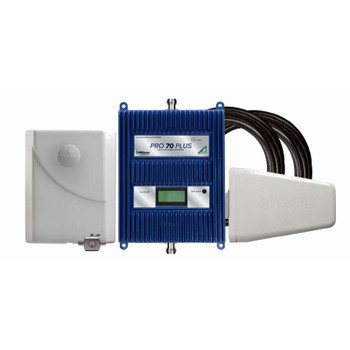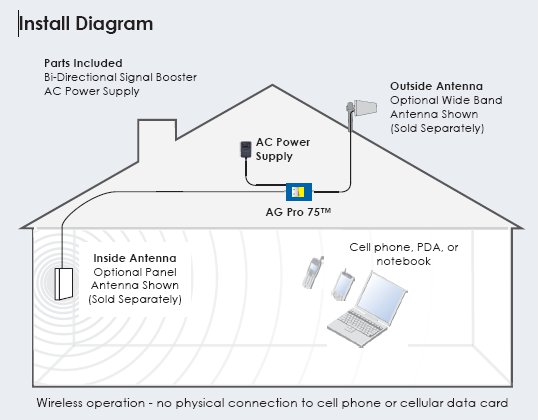Wilson AG Pro 70 Booster Information
Wilson Electronics AG Pro 70™
Adjustable Gain 800/1900MHz Smart Technology Signal Booster
Product Overview
The Wilson AG Pro 70 is a dual-band, installer-friendly cellular signal booster designed to provide a strong cellular signal inside a building. The model is Wilson Electronics’ first cellular signal booster to feature an adjustable gain control that allows the installer to optimize the unit’s gain to match the requirements of the building in which it is deployed. The adjustable gain feature also simplifies installation by making antenna placement less critical.
The AG Pro 70 is the highest gain signal booster Wilson has released to date. The unit delivers a maximum gain of 700 dB. The product includes Wilson’s patented oscillation and cell site overload protection, and proximity detection technologies to prevent interference on the cellular network. It works with all cellular devices on all North American service provider networks (except Clearwire, Nextel/iDEN).
Amplifier Features
- Adjustable gain control for optimal gain at almost any location
- Bidirectional amplifier boosts signal to and from cell site
- FCC type accepted, Industry Canada certificated
- Configurable with a variety of Wilson cellular antennas to fit virtually any building installation
Adjustable Gain Settings
Gain can be adjusted from 40 db to 70 db
User Benefits
- Boosts both incoming and outgoing signals
- Significantly extends connection range for voice and data
- Greatly reduces dropped calls
- Strong, reliable signal even in weak signal areas
- Faster data transfers (2G & 3G networks)
- Compatible with all North American cellular networks (except Nextel/iDEN)
Product Specifications
- Part # 460105 (Formerly 801280)
- Antenna Connectors: N Female
- Antenna Impedance: 50 ohms
- Dimensions: 5.7 x 4.2 x 1.5 inch (14.0 x 10.8 x 3.9 cm)
- Weight: 1.27 lbs (0.544 kg)
- Frequency 824-894 MHz / 1850-1990 MHz
- Passband Gain (nominal): 70 dB at 800 MHz & 75 dB at 1900 MHz
- Power output (uplink)- 800MHz / 1900Mhz
- - Power output for single cell phone (uplink): 30.8 dBm / 30.5 dBm
- - Power output for single received channel (downlink): 26.0 dBm / 25.2 dBm
- Noise Figure (typical): 3.5 dB nominal
- Isolation >90 dB
- Power Requirements (using supplied adapter): 110-240 V AC, 50-60 Hz, 8 W
* Specifications are subject to change.
Building Installation Market
The increasing adoption of smart phones, the NIMBY syndrome that limits construction of new cell towers, the advent of social media, and the current rise in telecommuting have combined to produce more voice and data traffic on increasingly strained wireless networks. These same forces are driving demand for strong, reliable cellular signals in homes and in small and medium office building complexes. Many business organizations find that employees avoid wire line phone systems in favor of their personal or company-issued smart cellular devices.
According to the Custom Electronic Design and Installation Association (CEDIA), the leading authority in the design and installation of home electronic solutions, the record housing market slump has convinced many homeowners to forgo buying newer homes. Instead they’re opting to retrofit their current houses with electronic upgrades, including installation of cellular signal boosters in environments where terrain, building materials, or distant towers are causing weak signal. With nearly 1-in-4 U.S. residents now choosing to drop in-home wire line phone service altogether, the need for a reliable cellular signal in the living space has never been more evident.
-


WilsonPro 70 PLUS Building Signal Booster System DIR/PNL [50 Ohm]
WilsonPro
*** The Wilson Pro 70 and Pro 70 Plus has been replaced by the weBoost Office 100 Signal Booster System The WilsonPro 70 Plus Commercial Building Cellular Signal Booster System offers up to 25,000 sq. ft. (outside signal...- SKU:
- AP463127
- Availability:
- Discontinued - Replaced By weBoost Office 100
- Discontinued:
- This System Has Been Replaced By The New weBoost Office 100 Signal Booster System

